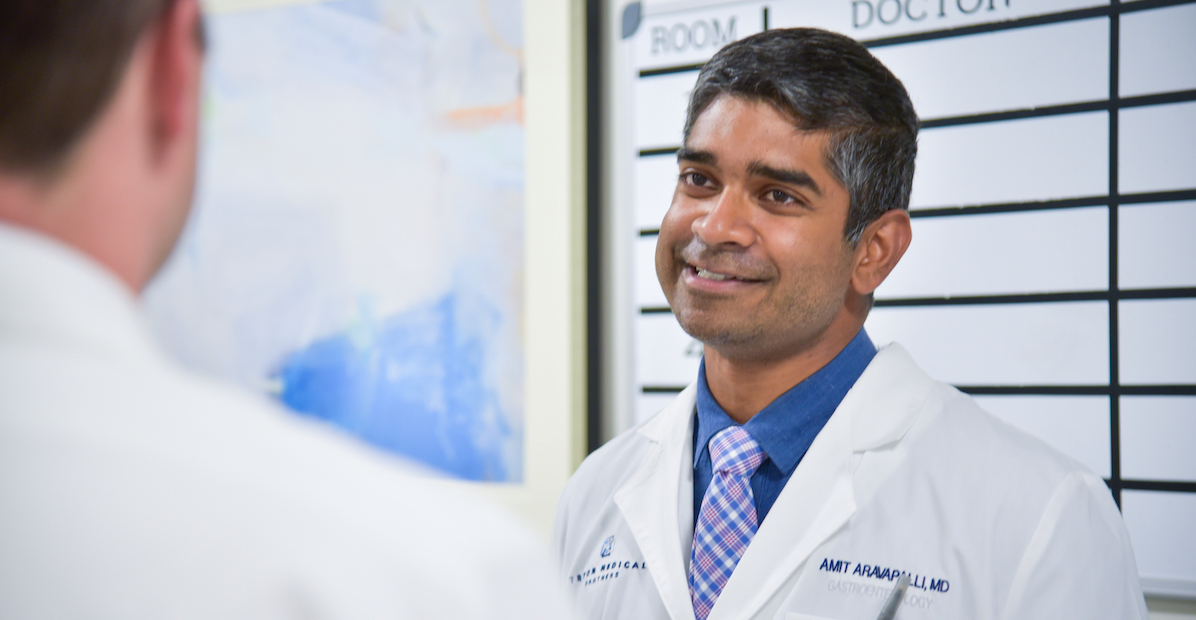
Hemorrhoids are one of the distinct displeasures in life that are often experienced but rarely discussed. While hemorrhoids are not usually a serious medical condition, they can significantly impact one’s quality of life, causing embarrassment, discomfort, and even debilitating pain in some cases. Understanding the causes, symptoms, and available treatments for hemorrhoids is crucial for proper management and relief from this common yet often misunderstood condition.
Tryon Medical Partners gastroenterology specialist Dr. Aravapalli weighs in on the world of hemorrhoids, shedding light on their origins, risk factors, and effective strategies for prevention and treatment.
What exactly are hemorrhoids?
Dr. Aravapalli explains that hemorrhoids are swollen veins in the anal area. These veins can be internal or external. Internal hemorrhoids are not visible from the exterior but can be visible to a clinician during a colonoscopy. External hemorrhoids are often visible from the outside. In terms of how they feel, hemorrhoids are often described as fluid-filled grapes.
How can I tell I have a hemorrhoid? Do hemorrhoids itch? Can hemorrhoids bleed?
Hemorrhoids can be difficult to identify but some common signs that you have hemorrhoids are:
- Bright red blood in your stool, on toilet paper, or in your toilet bowl
- Pain and irritation around your anus
- Swelling or fullness around your anus
- Itching
“If you see any of these symptoms, it could be hemorrhoids, but it could also be a sign of something more serious,” Dr. Aravapalli warns. “It’s always best to see your doctor if you’re not sure.”
How long do hemorrhoids last?
We all have some degree of hemorrhoids in our rectal area. Hemorrhoids are only truly felt when they are irritated or enlarged. Most enlarged hemorrhoids are self-limiting and can decrease in size on their own with conservative management in a few weeks.
How can hemorrhoids be prevented?
Hemorrhoids are often caused by lifestyle choices, which means they can be prevented with some simple changes. Dr. Aravapalli notes the following as preventative measures:
- Stay hydrated. We live in a society that loves caffeine. Unfortunately, it causes frequent urination and therefore dehydration. Staying hydrated (drinking plenty of water) is key to keeping your bowels moving and not having to strain on the toilet.
- Incorporate more fiber into your diet. Fiber (fruits and vegetables) is a key player in keeping things moving. Focusing on a fiber-friendly diet may help avoid constipation and keep the hemorrhoid pain and itchiness away. An over the counter fiber supplement could also help.
- Leave your phone outside the bathroom. Taking your phone, book, or magazine into the bathroom with you may be nice “me-time” but can keep you on the toilet longer than you need, inflaming your hemorrhoids.
- Check your daily medications. Allergy medications, like antihistamines, dry out your body, including your colon. This can also contribute to dehydration and trouble moving your bowels. This constipation can in turn lead to hemorrhoid development.
“Charlotte is beautiful in the spring, but there is a lot of pollen,” Dr. Aravapalli says. “Because of this, many people are on allergy medication that is drying out their body without even knowing it.”
Do hemorrhoids go away on their own? If not, how can I relieve hemorrhoid pain?
There are multiple ways to relieve itchy hemorrhoids.
- Hemorrhoid creams. These can sometimes work to relieve hemorrhoid pain for external hemorrhoids. However, creams aren’t going to be able to reach internal hemorrhoids. For those, Dr. Aravapalli recommends hydrocortisone suppositories.
- Hemorrhoid banding and surgical removal. These procedures are more invasive measures to treating hemorrhoids and can be quite painful.
“Unless you address the underlying problem causing the hemorrhoids in the first place, they will just keep coming back,” Dr. Aravapalli notes. “There’s no blanket advice for everyone, it really depends on the patient’s lifestyle to determine the root cause. Otherwise, no matter what you do, hemorrhoids will persist in being an issue. And if we address the root cause, we can often spare you from having an invasive surgery.”
When should I see a doctor for hemorrhoids?
Dr. Aravapalli recommends seeing your gastroenterologist if hemorrhoids are something you often struggle with.
However, if you have or experience any of the following, don’t assume anything. Go visit your clinician to get checked out:
- Blood in your stool
- Sudden change in bowel movements
- Family history of colon cancer or Crohn’s disease
“If you are having blood in your stool then you need a colonoscopy to prove the bleeding is from hemorrhoids – don’t just assume it,” Dr. Aravapalli encourages. “I have seen numerous patients over the years that get misdiagnosed with hemorrhoids and the blood in their stool is from another cause. Rates of colorectal cancer are on the rise in young people, so we want to rule out anything serious first and catch it early if it is there.”
If you are looking to soothe hemorrhoid discomfort, use MedChat to book an appointment with the Tryon Medical Partners Gastroenterology department today.
